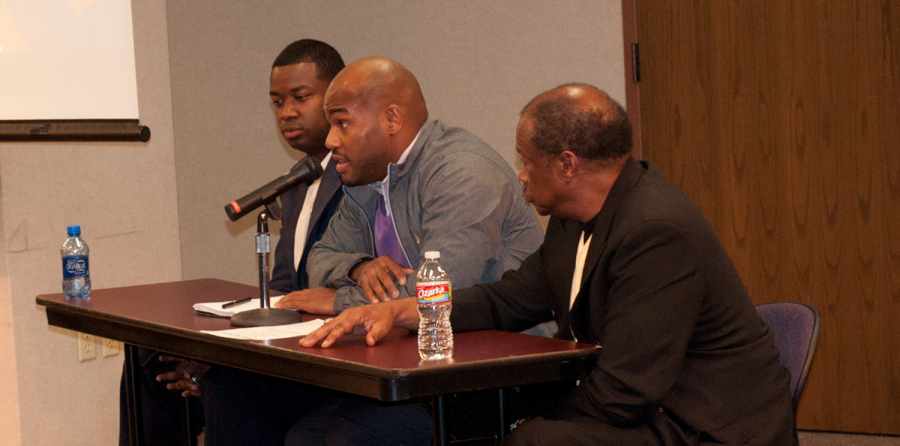
By Chanel Jimenez
Young athletes often don’t know what they’re going to do once their sports careers are over.
The African-American and Latino Male Initiative club hosted a panel that discussed that predicament and how athletes are being prepared for life after sports during the program “When the Season Ends and Real Life Begins” on Feb. 26.
The panel was led by two local university basketball coaches and a former TCU athlete.
“[Sports] should teach life lessons. It is all about preparing these guys for after basketball,” said UNT men’s basketball coach Rob Evans, who has been coaching college basketball for 27 years. “You’re not going to be playing basketball all your life. You are a professional athlete, then when you come out at age 34 you still have a long life [to work], so you have to be prepared for it.”
Evans also explained the important role a coach can play in the life of a young athlete.
“Some [kids] come from single-parent homes and don’t have role models,” he said. “You have to figure out what they need because you might be the last person that they talk to before they go into the real world.”
Terrance Maiden, a former TCU football player, is the co-founder of Two-Wins Foundation, a non-profit organization that takes young black and Latino males to different companies and shows them various career opportunities.
“Road to Success is a program where we take 150 students from different high schools and expose them, for instance, to the Omni Hotel and all the career options there,” he said.
Maiden shared his experience in college and how difficult it was for him to declare a major because he was not aware of the opportunities available to him.
“I didn’t declare a major until junior year and [did not start] networking until senior year,” he said. “[By that time] my peers were already ahead of me.”
Ulric Maligi, an assistant basketball coach at SMU, hopes programs such as these will help young men realize there are a variety of career fields for black and Latino males to consider.
“When I get the chance to make an impression, I show that I’m the first one in my family to get my degree,” he said. “I just try to change the culture and the mindset and try to expose these kids [to new things].”
The panel also discussed programs can help athletes learn life skills.
“We brought in a sports psychologist and it was unbelievable what came out,” said Evans, explaining that he was shocked to learn what his athletes were going through. “I’m trying to coach [these athletes] but how can I if I don’t know what is going on at home?”
Brazile later explained that it is important for faculty, staff and coaches to equip student athletes with the skills to go out and get a job.
“We want to ensure that we are presenting our young minority males with a holistic perspective and outcomes that they can attain,” said speech professor Courtney Brazile said, adviser of the African-American and Latino Male Initiative.
He also expressed the importance of teaching students the importance of giving back to the community.
“If they do go pro and make millions, one day they should know that we become so that others may become … then go back and help bring another young guy,” he said.







